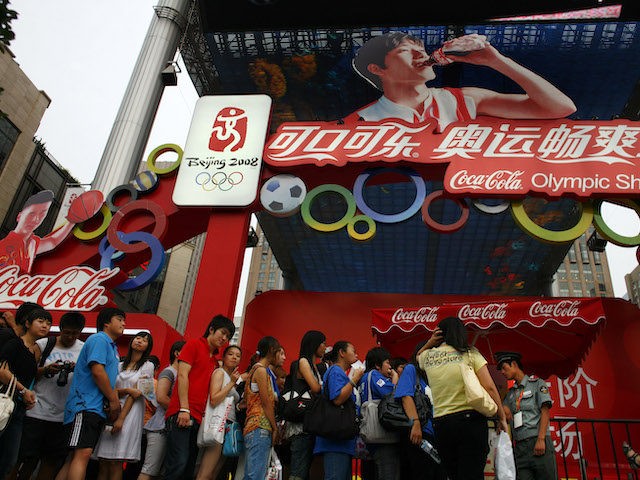A bipartisan congressional panel on Tuesday criticized brands such as Coca-Cola, Visa, Intel, Airbnb, and Procter & Gamble for sponsoring the 2022 Beijing Winter Olympics despite China’s human rights violations, including the genocide of Uyghur Muslims.
As Reuters reported on Tuesday, all but one of the corporate representatives who addressed the bipartisan Congressional-Executive Commission on China (CECC) hearing said they did not believe China is guilty of genocide against the Uyghurs. Only Intel executive Steve Rodgers said he agreed with the U.S. State Department’s verdict of genocide, rendered during the Trump administration and upheld by the Biden administration.
“Other executives said they respected the U.S. government’s conclusions, but would not weigh in on the matter,” Reuters noted.
The big corporations – so eager to ostentatiously weigh in on social issues in many other contexts – all said China’s abuses are none of their business, as long as the Olympic committee is willing to hold the Games in Beijing:
Republican Congressman Chris Smith told the Congressional-Executive Commission on China hearing that the sponsors needed to reconcile their “ostensible commitment to human rights” with subsidizing an Olympics where the host country is “actively committing human rights abuses”.
Smith asked each of the executives at the hearing – from Airbnb (ABNB.O), Coca-Cola (KO.N), Intel (INTC.O), Visa Inc (V.N) and Procter & Gamble (PG.N) – whether the games should be relocated or postponed due to concerns over human rights violations. All of them declined to opine, or said they had no responsibility over site selection.
“We do not make decisions on these host locations. We support and follow the athletes wherever they compete,” Coca-Cola’s global vice president for human rights Paul Lalli said.
Republican Senator Tom Cotton (R-AR) denounced the testimony of the corporate executives as “pathetic and disgraceful,” a cowardly abdication of their ostensible commitment to human rights because they know the tyrannical Chinese government would punish them for speaking up.
“Obviously, every one of you, with the exception on occasion of Mr. Rodgers, was sent here with orders not to say anything that could offend the Chinese Communist Party,” said Cotton.
“You are afraid of [China] in a way that you are not afraid of critics in the United States. I think that’s shameful,” said Rep. Tom Malinowski (D-NJ).
Malinowski said it was “absolutely clear” the corporations refused to criticize the Chinese Communist government because they were afraid of risking their profits from the Chinese market. He was especially vexed by Coca-Cola’s Lalli intoning that Coca-Cola “respects all human rights” while doggedly refusing to criticize Beijing for violating them.
The CECC hearing was also critical of the International Olympic Committee (IOC) for allowing the Beijing Games to proceed despite mounting evidence of China’s human rights abuses. Committee co-chair Jim McGovern (D-MA) accused the IOC of “cold indifference to genocide,” while Sen. Angus King (I-ME) suggested the committee should focus more on the IOC’s decision to award the Winter Games to Beijing than the corporations who were merely following along with that decision.
The CECC sent a letter to IOC President Thomas Bach last week asking for the 2022 Winter Games to be “postponed and relocated” unless China ends its “egregious human rights abuses.”
The committee told Bach:
To proceed with business as usual is implied consent and suggests the IOC has learned nothing from the Chinese government’s use of the 2008 Beijing Olympics to score propaganda wins and distract from its appalling human rights record. The IOC is on course to set a dark precedent where the behavior of future Olympic host governments is unconstrained by the international spotlight provided by the Olympic Games.
The letter noted it was unfair for the IOC to “force athletes to sacrifice their consciences in order to pursue their competitive goals, or vice versa,” by holding the Olympics in China – especially since the athletes could end up wearing clothing or consuming food that is a “product of forced labor.”

COMMENTS
Please let us know if you're having issues with commenting.